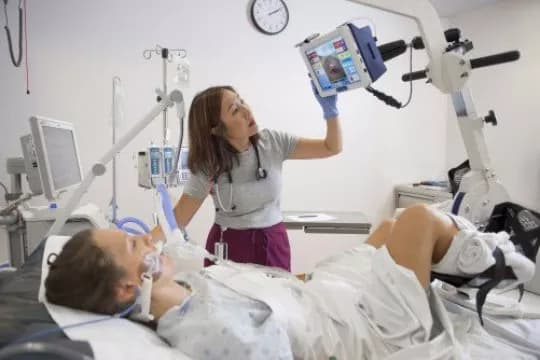
Cycling In Bed Is Safe For ICU Patients, Study Suggests
Early bicycle exercise during their stay in a hospital intensive care unit (ICU) may help some patients recover more quickly.
Researchers at McMaster University and St. Joseph's Healthcare Hamilton have demonstrated that physiotherapists can safely start in-bed cycling sessions with critically ill, mechanically ventilated patients early on in their ICU stay.
"People may think that ICU patients are too sick for physical activity, but we know that if patients start in-bed cycling two weeks into their ICU stay, they will walk farther at hospital discharge," says the study's lead author Michelle Kho, an assistant professor with the School of Rehabilitation Science at McMaster University and physiotherapist at St. Joseph's Healthcare Hamilton.
"Our TryCYCLE study builds on this previous work and finds it is safe and feasible to systematically start in-bed cycling within the first four days of mechanical ventilation and continue throughout a patient's ICU stay."
The research was published today in PLOS ONE.
Patients who survive their ICU stay are at high risk for muscle weakness and disability, and muscle atrophy and weakness starts within days of a patient's admission to the ICU. Cycling targets the legs, especially the hip flexors, which are most vulnerable to these effects during bed rest.
By strengthening their muscles and overall health, patients may go home sooner, stronger and happier. This not only benefits the patient, but could alleviate the high cost of critical care for the health care system. TryCYCLE is the first of a series of studies that will determine the effects of early in-bed cycling with critically ill patients.
Over a year, Kho and her team conducted a study of 33 patients in the ICU at St. Joseph's Healthcare Hamilton. The special in-bed cycling equipment was provided by the St. Joseph's Healthcare Foundation.
Patients were 18 years of age or older, receiving mechanical ventilation, and walking independently prior to admission to the ICU. The treatment in the ICU was 30 minutes of supine cycling using a motorized stationary bicycle affixed to the bed, six days a week.
The researchers found that early cycling within the first four days of mechanical ventilation among patients with stable blood flow is safe and feasible. Patients started cycling within the first three days of ICU admission and cycled about 9 km on average during their ICU stay.
These achievements even surprised the researchers.
"Patients' abilities to cycle during critical illness exceeded our expectations," says Kho.
She added that more research is needed to determine if this early cycling with critically ill patients improves their physical function. She said the next step is to have several hospital ICUs start the in-bed cycling study in a pilot randomized trial.
Kho holds the Canada Research Chair in Critical Care Rehabilitation and Knowledge Translation.
The TryCYCLE study was funded by the Canadian Institutes of Health Research.
Materials provided by McMaster University. Note: Content may be edited for style and length.
Disclaimer: DoveMed is not responsible for the accuracy of the adapted version of news releases posted to DoveMed by contributing universities and institutions.
Primary Resource:
Kho, M. E., Molloy, A. J., Clarke, F. J., Ajami, D., McCaughan, M., Obrovac, K., ... & Rudkowski, J. (2016). TryCYCLE: A Prospective Study of the Safety and Feasibility of Early In-Bed Cycling in Mechanically Ventilated Patients. PLoS One, 11(12), e0167561. DOI: 10.1371/journal.pone.0167561
Related Articles
Test Your Knowledge
Asked by users
Related Centers
Related Specialties
Related Physicians
Related Procedures
Related Resources
Join DoveHubs
and connect with fellow professionals

0 Comments
Please log in to post a comment.